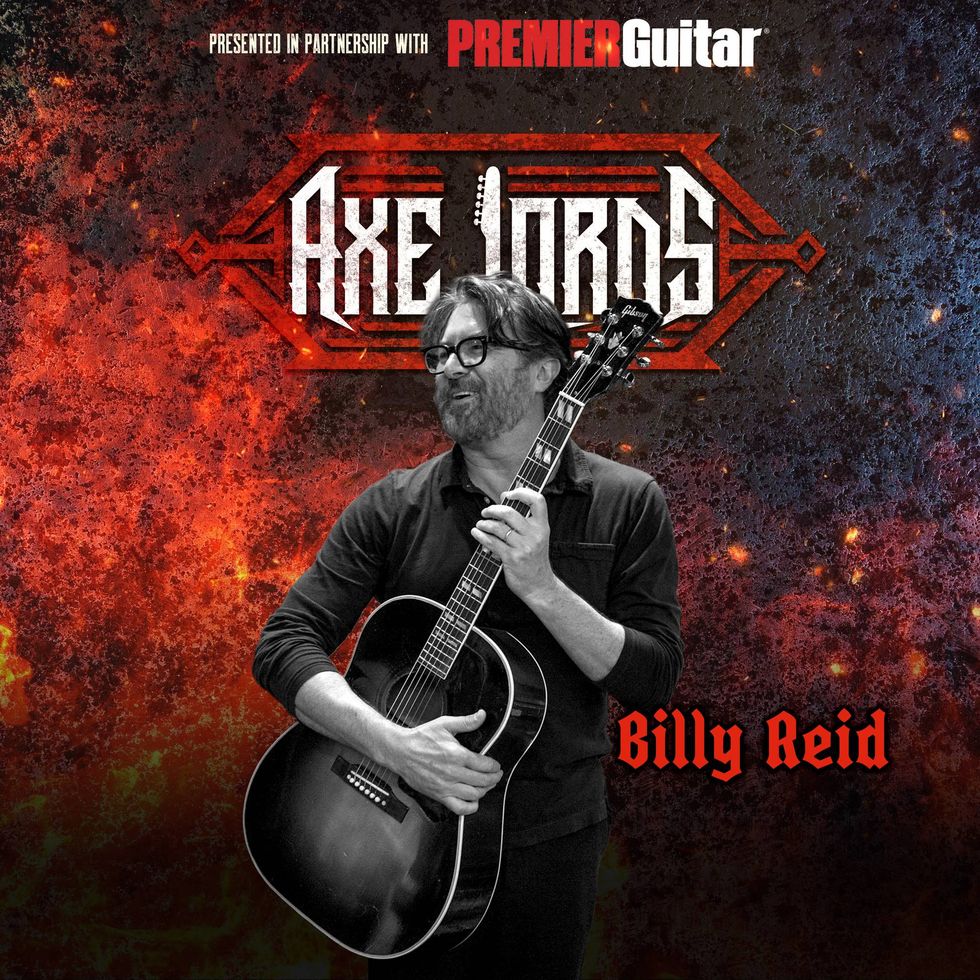When Slayer played their last show in November 2019, Kerry King already knew he had no intention of slowing down musically. What he didn’t know was that the pandemic would be the conduit to a second act. But, as German theatrical director, dramaturge, and playwright Bertolt Brecht once astutely observed, “Art is not a mirror held up to reality, but a hammer with which to shape it.”
Covid helped shape the foundation of King’s musical future, because the pandemic inadvertently created a luxury he’d rarely experienced before: time. Rather than feeling inconvenienced by the delays, he homed in on elements of his craft in ways he’d never done before, and the resulting album and his solo debut, From Hell I Rise, became his hammer.
“The pandemic really shaped the sound and the performance on this record,” says King. “It gave us some flat tires at first, because Paul [Bostaph, drums] and I both caught Covid, and it took a while for us to get back in the saddle.”
Bostaph had already digested so much of the material by the time they dove back into recording that it became a real game changer compared to how they’d worked together previously in Slayer. “It was the first [project working together where] he heard all the lyrics before he recorded, and he heard all the leads except one or two. It’s the most prepared he ever was, and being so familiar with it made it that much easier for me to play what I wanted to play.”
Kerry King - Idle Hands (Official Audio)
King is a cofounding member of Slayer and arguably one of the most instantly recognizable and well-respected thrash metal guitarists of his generation. Over nearly 40 years, he has pioneered some of the most brutal and revolutionary guitar riffs ever created in the genre. His singular use of the tremolo—pulling up more than pressing down—and the multiple tunings that pepper the band’s catalog, from D# to C# to B, are just two of the attributes that set King apart from his contemporaries. He also wrote or cowrote some of Slayer’s most incendiary songs, including “Mandatory Suicide,” “Repentless,” “Hell Awaits,” “Disciple,” and “Raining Blood.”
With Slayer—who have announced reunion dates for September 2024, five years after the group’s official terminus—King lays claim to six RIAA gold certifications, one multi-platinum plaque, and five Grammy nominations with two wins in the category of Best Metal Performance for the songs “Eyes of the Insane” and “Final Six,” both off of the Christ Illusion album.
“[My solos are] usually an afterthought, and the last thing to get done. This time everything was thought out [beforehand] and not just thrown in there.”
Known for his allegiance to the Las Vegas Raiders NFL football team, his love of snakes, and his taste for Jägermeister, King is outspoken, opinionated, and authentic. The self-proclaimed “metal kid” famously takes himself a little too seriously for some. But the real testament to his seriousness lies within his attention to detail, and the songcraft on From Hell I Rise, as well as the time he and Bostaph spent refining the material during the pandemic, is demonstrative of his commendable work ethic.
Kerry King's Gear
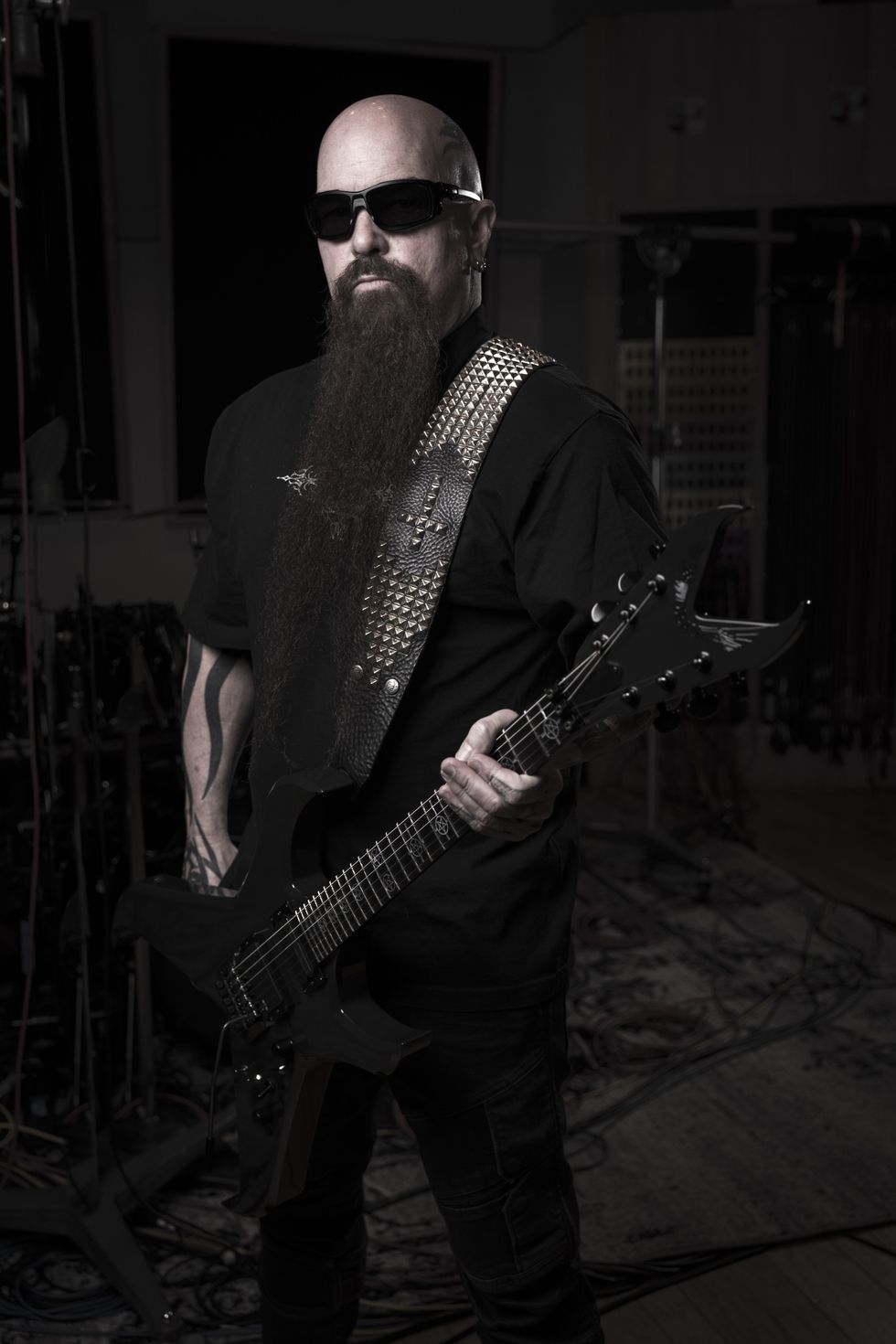
As King’s debut solo release, From Hell I Rise was born and shaped during the pandemic, which came on the tails of Slayer’s last show in 2019.
Guitars
- Dean USA Kerry King V Limited Edition
- Dean Kerry King V Black Satin
- Dean USA Kerry King Overlord Battalion Grey
- EMG KFK Set
- Kahler Tremolos
Amps
- Marshall JCM800 2203KK
- Marshall MF400B Mode Four
Effects
- Dunlop DCR-2SR Cry Baby Rack Wah
- Dunlop Wylde Audio Cry Baby Wah
- MXR Flanger M117R
- MXR Kerry King Ten Band EQ KFK1
- MXR Wylde Audio Overdrive
Strings & Picks
- Dunlop String Lab Series Kerry King Guitar Strings (.010–.052)
- Dunlop Triangle .73 mm
Every note seems intentional, every beat meticulously composed, yet all of it played with a spontaneity that belies its years-long incubation period. Having almost all of his solos worked out by the time he went into the studio was a refreshing approach. “They’re usually an afterthought,” he admits, “on the back burner, and the last thing to get done. This time everything was thought out [beforehand] and not just thrown in there.”
From Hell I Rise is a decisive musical statement from a man on a mission, out to prove himself after the then-apparent demise of one of thrash metal’s “Big Four,” and was eventually spurred on by a furious two-week recording session at Henson Recording Studios in Los Angeles. Featuring a band that also includes bassist Kyle Sanders (Hellyeah), guitarist Phil Demmel (Machine Head), and vocalist Mark Osegueda (Death Angel), the record rages with intensity—real musicians playing real metal in real time. In an era when technology can often smooth the edges off the human element on recordings, From Hell I Rise features fire-breathing performances from musicians who clearly honed their craft long before the crutch of technology was made available. And even though it has an intangible, nostalgic vibe to it, make no mistake, it is not some relic from the bygone past, but rather a bristling, modern-sounding tour de force.
“If you’ve ever liked any Slayer throughout any part of our history, then there’s something on this record that you’ll get into.”
From the opening salvo of “Diablo,” an instrumental call to arms that harkens back to early ’80s Iron Maiden, to the first single, “Idle Hands,” a fast, aggressive track that highlights King’s deft, articulate approach to rhythm guitar, to the detuned manic riffing in the title track, From Hell I Rise runs the gamut from classic punk to thrash to straight-up old-school heavy metal. Familiar topics, including religion and war, abound. Herculean speeds are achieved. King says the album is heavy, punky, doomy, and spooky. “If you’ve ever liked any Slayer throughout any part of our history, then there’s something on this record that you’ll get into.”
Part of the X factor on From Hell I Rise comes courtesy of producer Josh Wilbur (Korn, Lamb of God, Avenged Sevenfold, Bad Religion). King says Wilbur grasped his lead guitar sound better than anyone he’s worked with in the past. “It’s a hard thing to duplicate if you’re not standing in front of it in a live environment,” he attests. “Whatever Josh did in his mixing and mastering, it’s the closest to my live sound I’ve ever heard. I know it’s a weird adjective, but it’s really fat and ominous. I’m super happy with it.”
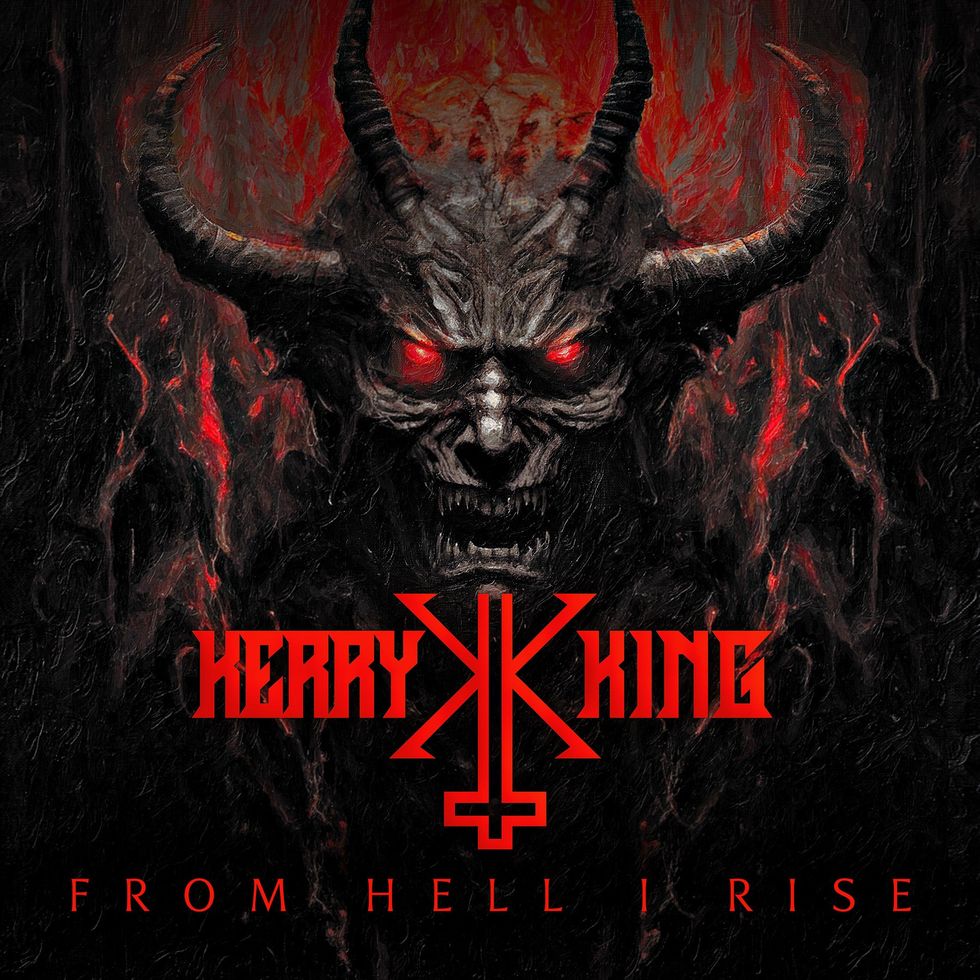
For From Hell I Rise, King took a new approach by planning out his solos in advance of the album’s recording.
Reigning Phoenix Music cofounder Gerardo Martinez was responsible for suggesting Wilbur to King. “We had a meeting down in Southern California,” he recalls. “I wanted to make sure I could respect the guy because if I don’t respect the guy, I’m not going to play it 10 times if he asks me to. I want somebody that will tell me to do that if I need to, and I’ll listen to him.” He says Wilbur is a wizard in the studio who brought intensity and energy to the recording sessions.
King doesn’t tinker much with his rhythm tone in the studio from song to song. He’s more of a set-it-and-forget-it kind of guy. “We just go for the main rhythm because there’s not a whole lot of things that need my sound to change,” he explains. “If it’s a spooky song or something that needs a different vibe, I’ll mess around with it. But I’m going for the home run. I’m going to set my tone and roll with it.”
“Whatever Josh [Wilbur] did in his mixing and mastering, it’s the closest to my live sound I’ve ever heard. I know it’s a weird adjective, but it’s really fat and ominous.”
King is a bona fide “super old-school” guitarist and runs through a very meat-and-potatoes signal chain for his rhythm tone. He goes from his Marshall JCM800 2203KK signature amp to Marshall MF400B Mode Four speaker cabinets with “a guitar right in front of it.” That’s it. No frills to the core. His self-assessed “primitive” approach also applied to the demos he sent to Bostaph in the early stages of writing the new album—he has no home studio to speak of. “I’m playing out of an amp that’s about as big as my boot and recording it on my phone,” he admits. “It’s deceptive how decent that sounds.”
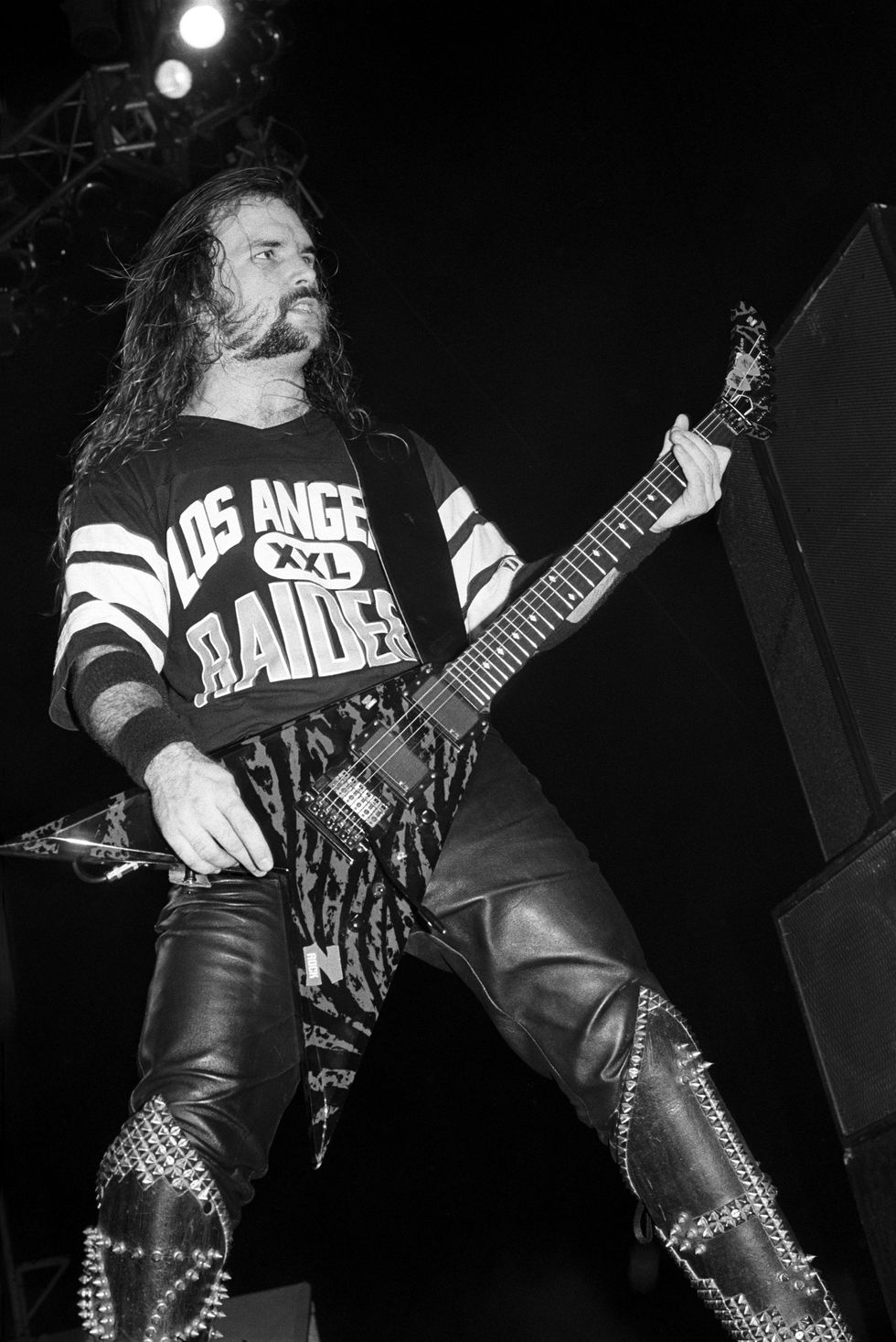
King performing with Slayer at Nassau Coliseum in Uniondale, New York on February 14, 1991.
Photo by Ebet Roberts
Live, King runs three of his signature amps and staggers the speaker cabinets—head one will go to cabinets one and four, head two goes to cabinets two and five, and head three goes to cabinets three and six. In this setup, the heads are not powering the cabs directly below them in a column. “I really love it because I’ve got a wash of all three heads at once,” he explains.
Due to his writing style, there’s also not a whole lot of space for effects in his guitar sound. “There’s not room for things like delay, because it’s very precise,” he says. His rhythm playing is a cornerstone of his brand, and much like James Hetfield with Metallica and Scott Ian with Anthrax, he plies his trade by executing flawless, intricate rhythms at breakneck speeds. The secret he says, is all in the wrist. “A lot of people don’t know that they don’t need to play from the elbow,” he explains. “If you want any kind of speed and you want to be articulate, you’ve got to play from the wrist. You’ve got to have as minimal movement as you can.” The elbow, he explains, is too far from the pick to be the appropriate hinge for speed. “If your action is coming from your wrist, you’ve got a lot more control over the speed and the articulation. That’s how it’s got to be if you want to play this kind of music.”
“I wanted to make sure I could respect the guy because if I don’t respect the guy, I’m not going to play it 10 times if he asks me to.”
King has historically paired himself with equally capable guitarists: first Jeff Hanneman, then Gary Holt, and now Demmel. He says that he’s never had to adjust his playing style to any of them, but does note what differentiates Holt and Demmel from Hanneman, and how that affects his live performances. “I had to learn to not listen to Gary and Phil because they’re a lot more melodic than Jeff was,” he assesses. “And I don’t mean that in a detrimental way. It’s just that Jeff had his style. Gary is super melodic, and I think Phil’s even a bit more melodic.” Shifting his focus from listening to what the other guitarist is doing so he can pay attention only to what he’s playing has become King’s superpower when playing live.
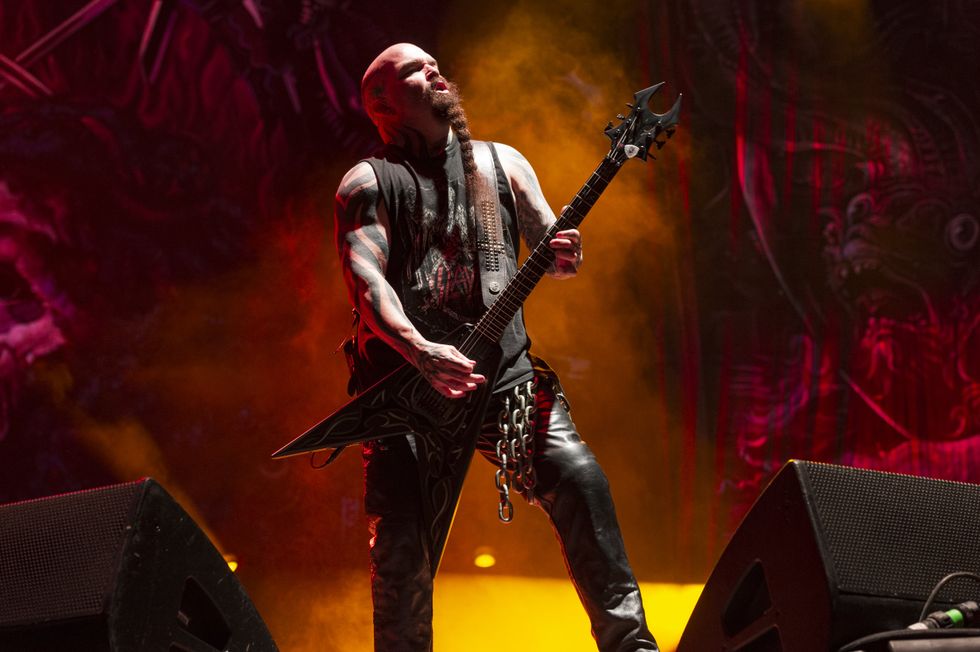
With Slayer, King has six RIAA gold certifications, one multi-platinum plaque, and five Grammy nominations.
Photo by Jordi Vidal
The addition of Sanders on bass has, however, pricked up King’s ears and facilitated an adjustment on his part, albeit in the demoing and recording phase of music making. “Early on, I sent Kyle four songs with no bass just because I didn’t want to influence him, even though I’m totally capable of playing bass on a record or on demos,” he attests. “I’m like, ‘If I’m going to let this guy play bass, let’s let him come up with something.’ Maybe it’s something I wouldn’t think of because I’m a guitar player. I’m not a bass player.” Within two days, Sanders sent back the same four tracks with bass. King was blown away. “I’ve never had anybody that into playing bass—it was very refreshing for me. So every time I sent him demos, I sent him bass-free ones.”
“I just play stuff until I find something that has a strong chorus, intro, or verse rhythm. Then I try to find some friends that make it a better song, and go from there.”
King moved to New York after Slayer called it quits in 2019. Now, when he goes back to Southern California to rehearse, he gets a rental car with SiriusXM radio, and has since gone through “a real big Ritchie Blackmore renaissance,” he shares. “Man, Deep Purple was so good. Blackmore was a madman. And that band was a supergroup. I mean, [keyboardist] Jon Lord, [drummer] Ian Paice; regardless which singer you’re talking about, there’s so much talent in that band. It took me a minute to go back and realize it and now I’m like, ‘How did I not like this more [when I was younger]?’” King, perhaps influenced by this “supergroup” concept, certainly assembled an A-list cast of musicians for From Hell I Rise.
Despite the musical pedigree Bostaph, Demmel, Osegueda, and Sanders bring to his first solo album, one can’t help but wonder if King’s criteria for bandmates has as much to do with camaraderie as it does skillset. “I put a lot of songs together in ’20 and ’21,” he attests. “I just play stuff until I find something that has a strong chorus, intro, or verse rhythm. Then I try to find some friends that make it a better song, and go from there.”
YouTube It
Ignited by Kerry King’s co-lead playing, Slayer decimates the audience in Sofia, Bulgaria back in April of 2020.


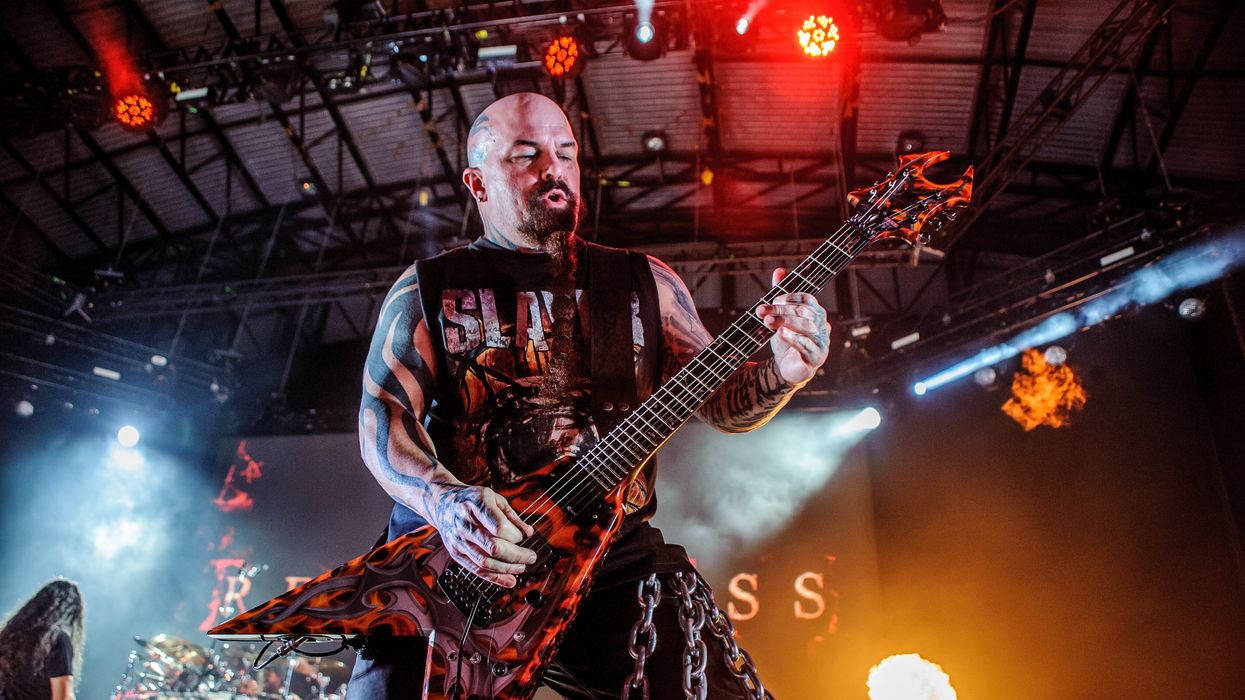








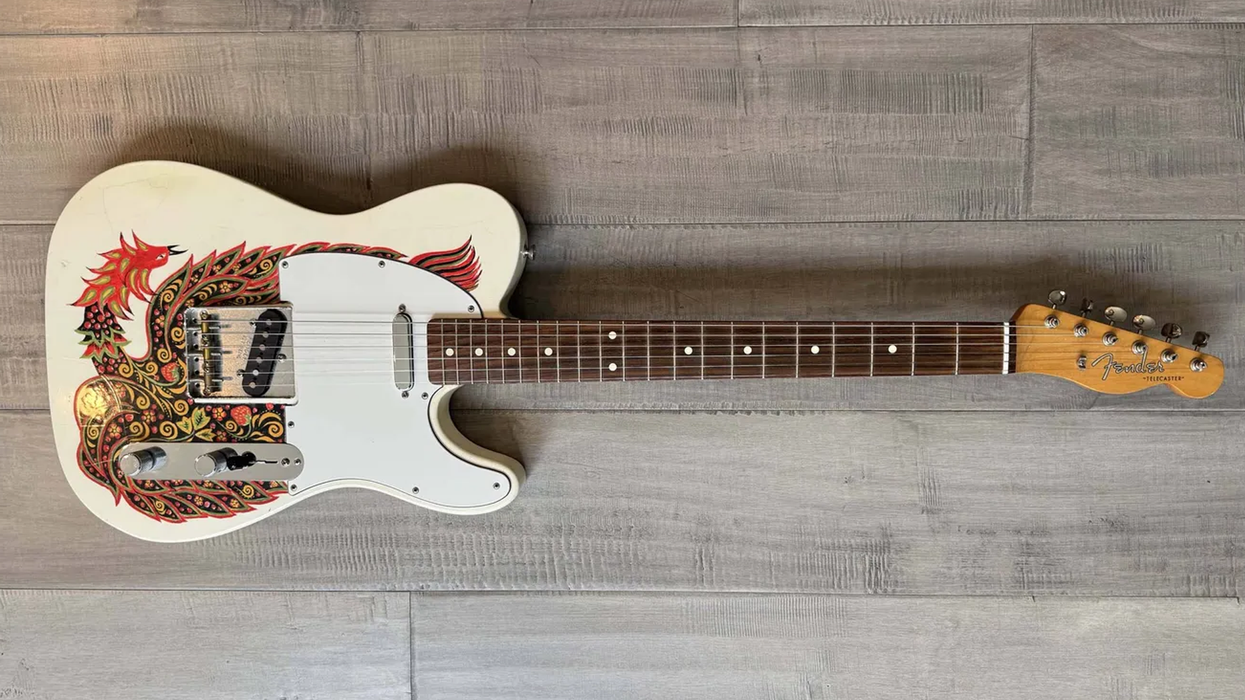
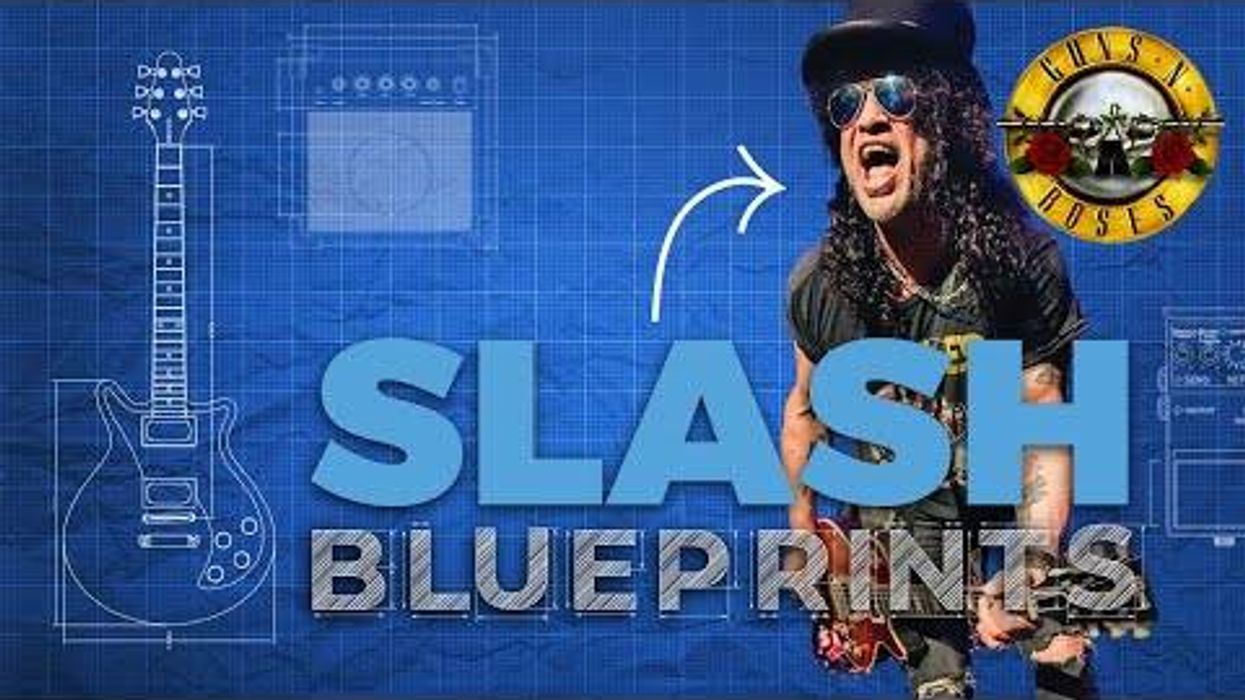

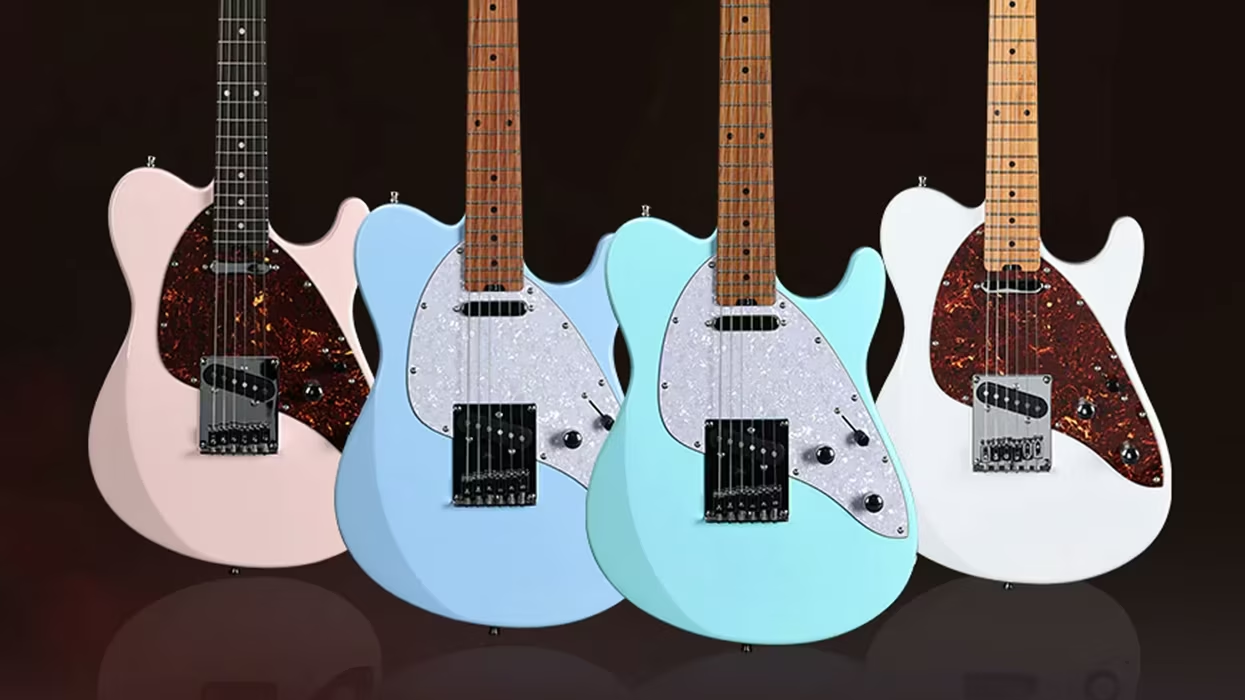


![Rig Rundown: Russian Circles’ Mike Sullivan [2025]](https://www.premierguitar.com/media-library/youtube.jpg?id=62303631&width=1245&height=700&quality=70&coordinates=0%2C0%2C0%2C0)








